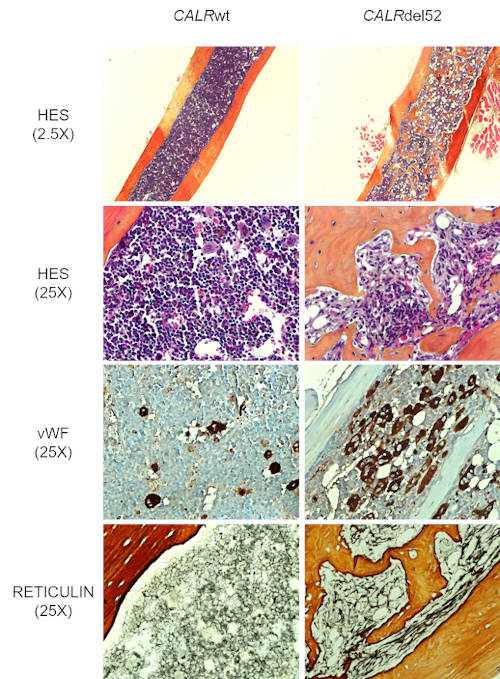From haematopoietic stem cell to megakaryocyte
This group belongs to the UMR 1287: Hematopoietic stem cells and the development of hematological malignancies
Our research:
- Focuses on the mechanisms that allow hematopoietic cells to produce platelets in order to explain how abnormalities in these cells can lead to platelets disease and leukemia.
- helps to predict patients who may develop myeloproliferative neoplasia or leukemia
- allows the discovery of new therapeutic targets to treat patients suffering from deregulation of platelet production (decreased or increased number).
- This research concerns patients of all ages.
Current research
Our team has been working for many years in hematology on the mechanisms of normal and pathological megakaryopoiesis. This process consists in the generation of platelets from megakaryocytes (MK). Our projects stem from our previous research and the specific objectives are divided into 5 axes:
1)We study precisely the regulation of normal megakaryopoiesis by focusing on the role of transcription factors (RUNX1, FLI-1, SRF, GATA1) and epigenetic factors (ASXL1, ASXL2, EZH2, TET2).
2) We investigate the development of megakaryocytic diseases thanks to the study of two types of pathologies which constitute a reservoir of information for fundamental biology: hereditary thrombocytopenia, and sporadic and familial myeloproliferative neoplasms (MPN) (essential thrombocythemia, myelofibrosis primary).
3) We perform genome-wide approaches to identify germline predisposition factors implicated in the development of inherited thrombocytopenia and familial MPN and we study the function of identified variants.
4) Since these megakaryocytic diseases can progress to leukemia, they are excellent models for understanding the different stages of leukemogenesis and we are dissecting the precise mechanisms of this transformation.
5) Inherited thrombocytopenia and NPM can affect not only definitive hematopoiesis but also primitive (embryonic) hematopoiesis and one of our objectives is therefore to better understand the ontogenesis of hematopoiesis.
To achieve these goals, our team has developed many national and international collaborations. Our research is also based on very strong relationships with the clinical team of the department of hematology at Gustave Roussy and clinicians and biologists are directly involved in the projects of our team. Different proofs of concept from our basic research have shown great transfer potential. Some of our discoveries has already led to the identification of predisposing factors for MPN and leukemias (patent), and will enable us to better predict patients at risk and diagnose/predict those who are already affected. Predisposed patients are followed in oncogenetics at Gustave Roussy and those at risk are regularly checked for the development of clonal hematopoiesis (FPD /AML, 14qCNV). We are also developing mathematical algorithms to predict patients’ response to treatment (IFNa) in MPN and have brought proof of concept of a curative treatment of MPN by combining IFNa with other molecules (arsenic, specific inhibitor of JAK2).

Bone marrow analysis of CALRdel52 mice
(Modeling myeloproliferative neoplasms)
